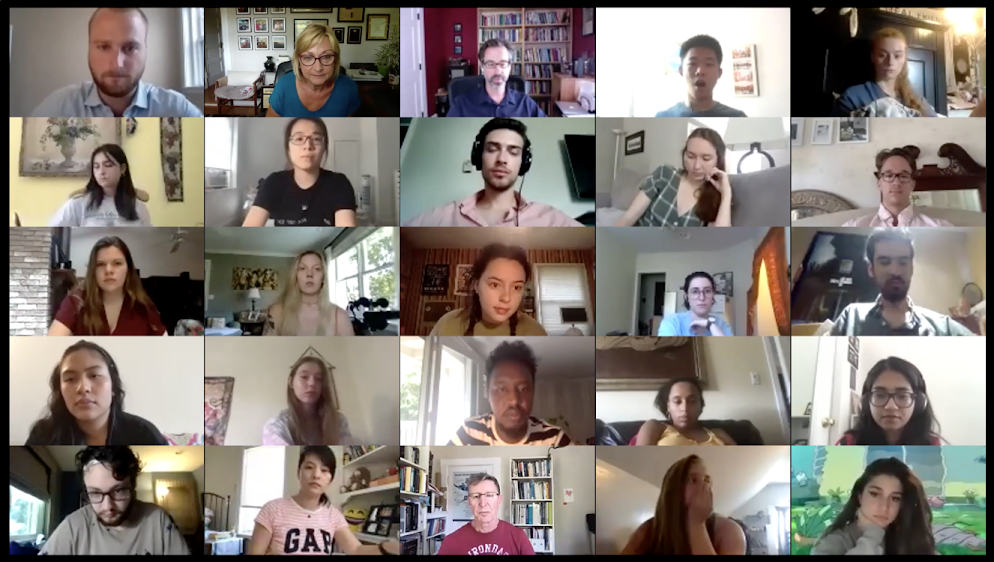Emerson Takes on The Future of Work, Learning and Everything

By Molly Loughman
Early in the summer, as the pandemic began to reshape so many aspects of the working world, Lu Ann Reeb wondered how the changes would impact students soon to enter that world. So the Marketing Communication professor and veteran entrepreneur took action, and teamed up with colleagues to create a skills-building seminar for operating in a COVID-restricted world.
“I think we have a responsibility to help students think through this change. Eventually we’ll resume to normal, but it’s not going to be exactly how it was,” says Reeb, a senior executive-in-residence and now assistant dean in the School of the Arts, who‚ in a matter of just two weeks, co-created The Future of Work, Learning and Everything, a, one-credit, non-tuition seminar.
“It really hit me with students graduating and unable to find jobs, current students who lost their internships or part-time jobs, and just looking at the bigger picture of the world,” Reeb said. “Everything is in a complete shift and we don’t know where it’s going, so I thought, ‘What could we do about this?’”
The pandemic has halted film productions, closed theaters, and sent journalists, advertising, and marketing agencies home to work, challenging them all to find new ways to collaborate. To help students prepare for new and future change, Reeb and Eric Gordon, a professor of civic media and the director of the Engagement Lab, fast-tracked a curriculum for a workshop-based, skills- and mindful-thinking-oriented course encouraging students to brainstorm what could happen and how to thrive in the future workforce. With help from Marketing Communication Professor Thomas Vogel and instructor Cliff Notez, they conducted the seminar July 27-August 14 for 36 curious Emersonians from all majors.
“This class was an exercise in speculative design. It was about putting into practice design strategies and methods to achieve a productive reimagining of the institutions that we exist within,” says Gordon.
“You really have to live the change.” Reeb adds. “Students had to feel that anticipation and the not knowing. And I think you get stronger when you do that.”
The Future is Coming On…
Each week of the seminar were separated into “design sprints,” through which students envisioned life in 2030 as it related to work, education, and “everything else” (topics based on students’ interest). “Instead of the seminar being a worry for them, I think it stretched their minds out. They were thinking about bigger problems,” said Reeb.
The scenarios they imagined included film production in a semi-virtual and semi-in-person world, more contract-based service opportunities, more shared workstations, mandatory civic engagement in education, urban rental space transformed into low-income housing, urban transportation pods, equal Internet access, virtual travel, and community art spaces.
“In the weekly meetings with my teams, I realized a vast amount of insights and perspectives. Cross-functional collaboration between students in different programs can be so powerful, so diverse, so rich,” says Francisco Miranda de Sousa, a graduate assistant in the seminar and student in the Strategic Marketing Communication program.
Miranda de Sousa and the other graduate assistants coached student teams through their weekly challenge. On the following Monday, the teams presented their findings in a variety of ways — through essays, song, a podcast, infographics, poems, speeches, videos, and PowerPoint presentations. At other times, the faculty instructors led discussion-based workshops through an array of topics, including creative thinking, collaboration, virtual leadership, mindful thinking, project management and iterations of agility.
The Future of Work, Learning and Everything introduced Kinnelon, New Jersey, native Kevin Skorr ‘20 to the technique of creative thinking and its two core concepts: “divergent thinking” (free-form thinking and the generation of new ideas) and also “convergent thinking” (eliminating ideas that don’t work).
“A light just popped up in my head,” says Kinnelon, admitting he previously practiced more convergent thinking. “I’m able to now understand when I have divergent or convergent thinking, and then I can use these skills to navigate myself towards completing the creative process how I want to. It helps me understand how my mind works.”
At its core, says Gordon, the seminar was designed to deliver on the intent of college: to prepare students for what comes next. “We think about college as an incubator for new ideas, and this is an opportunity for students to be active participants in what happens next and not just be a recipient of the future,” he added.
The Future of Work, Learning and Everything will be offered again under the School of the Arts in January, expanding to four credits and four weeks.

Categories